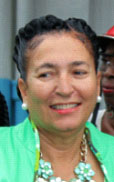City Councillors on Tuesday voted for the setting up of a National Capital Planning Com-mission to guide the development of the city, while Mayor Patricia Chase-Green dismissed concerns by Deputy Mayor Sherod Duncan about the rush in moving ahead.
Chase-Green called an extraordinary meeting on Tuesday to establish the commission, which was recommended by President David Granger, during his address to the council in the previous week.
At the meeting, 23 councillors, including Duncan, voted for having a commission, while Councillor Salima Bacchus-Hinds, of the Team Benschop for Mayor group, abstained.
In keeping with President Granger’s vision, the objective of the commission would be to create policies that would chart urban renewal in the city. Granger had said the body could review past and future plans for the capital as well as outline issues that would be addressed. “The city must be sanitary, it must be clean. We all aim at a clean city, a green city, a serene city, a safe city,” he had said.


Chase-Green, in her opening address at Tuesday’s meeting, said the commission would allow the council to plan strategically to move Georgetown forward.
Councillor Akeem Peter questioned the proposed membership of the commission, who would be financing it and if the council would have authority over it or if it would be an independent body. In response, Town Clerk Royston King said that the commission would be financed through budget allocation from the Mayor and City Council and would be a partially independent body, with authority given by the council. King also explained that reports prepared by the commission would have to first be adopted by the council and then submitted to central government.
In addition, Chase-Green suggested that its membership would be drawn from different organisations, such as ministries of Public Health, Communities, Public Security, Guyana Water Incorporated, the University of Guyana and other key stakeholders in urban development.
Some councillors suggested that public consultation be held before the commission is established. Councillor Sophia Whyte said the civic engagement is needed for proper consultation.
Some councillors also asked for time before making recommendations on the commission’s Terms of Reference. Some did, however, suggest that these should be based on prevalent issues, such as squatting, vending, drainage and irrigation, school dropouts and literacy, sanitation, strategic planning, and preservation of historic sites.
It was also proposed that copies of reports from studies on the development of Georgetown be made available and used as guidance in creating the Terms of Reference.
‘Why the urgency’
Duncan objected to the proposed one-week deadline for councillors to submit their recommendations for draft Terms of Reference, while questioning why the infant council was being burdened with rash decision-making.
“I’m wondering why this urgency… I have no trouble looking at it; but it is the haste at which we are looking at it,” he said, while noting that since the new councillors have been sworn in, they have had to grapple with pre-existing decisions, such as the controversial parking meter deal and the relocation of vendors from the Stabroek Market.
But before he could conclude his remarks, Mayor Chase-Green interjected and noted that the lifespan of the council is short and, therefore, they needed to act.
She stressed that there has been too much negativity in the council when decisions are made to move ahead with its work. Additionally, King said that while the decisions may seem to be hasty, the situation is actually the opposite. “We are moving at a snail’s pace…,” he interjected.
However, Duncan pointed out that hasty decisions in the past have only been burdensome on the council. As he spoke, the mayor’s facial expressions indicated her disapproval of his argument. Their opposing views on the contentious parking meter contract has recently intensified division on the council.
After the discussions on the establishment of the commission, the decision was taken for councillors to submit their written recommendations for the Terms of Reference in one week, after which King would be tasked with crafting a draft policy and presenting it to the next statutory council meeting in two weeks.
Granger, during his address to the council, had said that any urban plan created by it must be based on what is required in the city. The prospective plans, he said, must also aim to be a collaboration with the Central Government, the Central Housing and Planning Authority and the Ministry of Communities and organisations they would be working with to develop the capital city.
The Head of State emphasised that keen interest must be placed on the location of entertainment hubs and business complexes, which he said ought not to intrude into areas designated as residential zones. “Locations should be identified for the construction and development of aesthetically picturesque roadways and malls, arcades for vendors,” he added, while urging that these be created to ensure that every vendor is placed under a roof and not be exposed to elements which would prevent them from earning an income. “There is no need, decade after decade, for poor citizens who are trying to make a living, [to] be exposed to the elements… let us see what could be done to expand and extend markets and give those poor vendors roofs over their heads,” he said.






